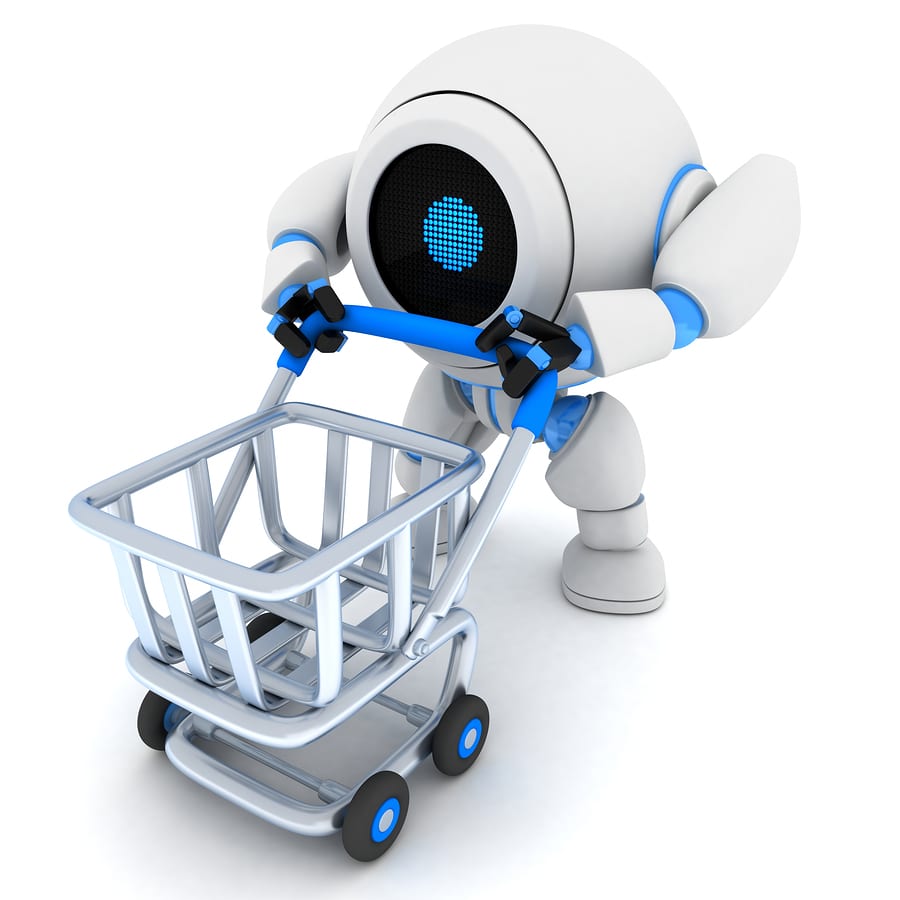How to Use Ecommerce AI to Boost Sales

When you think of AI, or artificial intelligence, the robot revolution and its scary aftermath might come to mind. It’s not uncommon. AI is very much still misunderstood, which is what makes it such a hot topic across industries, including ecommerce.
The truth might surprise you: You’re probably already using AI both in everyday life and while selling online.
AI is a huge part of the modern landscape, and it has been revolutionizing ecommerce by completing the tasks that humans simple don’t have the time to do. Therefore, it is a way to increase revenue by making online retailers faster, smarter and more efficient.
If you’re not using AI technologies for your online stores, you’re missing out on opportunities to gain customers, improve loyalty and bolster your customers’ experiences.
Here is how to use ecommerce AI to boost sales.
What is AI?
AI is a buzzword that refers, at its core, to software that acts according to an algorithm or a pattern. An associated term is “machine learning,” which is simply the way the software will recognize new patterns in the data it receives to respond accordingly.
Chances are you already use AI in the form of Siri, Alexa or Google Voice. Have you ever noticed how your favorite voice-activated device gets “smarter” over time? This is because it is responding to patterns in your usage, and more usage equals more data to learn from.
Similarly, AI processes massive amounts of data in the realm of ecommerce. If you’re looking to add any of these tactics to your strategy, then artificial intelligence is the way to go.
Embrace Personalization
We’ve already covered why email personalization is a crucial part of a successful marketing strategy, but the common thread is that recipients are far more likely to engage with a personalized email than a generic message. This in turn drives massive ROI. Personalizing emails is typically done by AI, which scans your address list for your contacts’ names before inserting them into the subject line or body of your email.
AI is also the force behind product recommendations, such as the “Frequently Bought Together” section on product pages. By tracking purchases, AI can recognize and display recommended companion products and increase average order value.
It is easy to see the benefit of AI in this situation when you consider that:
- 80% of consumers enjoy seeing product recommendations, per Listrak.
- 49% of consumers have bought something they didn’t initially need because of product recommendations, per Segment.
But product recommendation isn’t the end of how ecommerce AI can personalize shopping experiences to boost sales. Companies are starting to use AI in search to show more relevant results to online shoppers—the software “learns” how to contextualize searches for more accurate results and improves over time by learning as it goes. As a result, fewer frustrated consumers exit the online store, sometimes abandoning a cart in the process.
Combat Cart Abandonment
Cart abandonment is the $4 trillion problem e-tailers are looking to solve, and the good news is it can be combated with ecommerce artificial intelligence. There are two common marketing tactics you might already be using that, in fact, run on AI: email and a pixel from Adwords or another site.
Artificial intelligence is what captures data from visitors to your online store and then serves them emails, display ads or even messages (from a Messenger chatbot, for example) or app notifications depending on the information available. The shoppers have already expressed interest in your online store, so these retargeting efforts simply keep your products in the front of their minds until they finally purchase.
Retargeting is a proven successful strategy that makes it 70% more likely to convert site visitors into paying customers, and it is made possible with AI.
Improve Customer Service
Customer service is a major pain point for many online retailers because of its time-consuming and repetitive nature. It is also expensive—US companies lost $75 billion last year to competitors with better customer service.
Good customer experience drives sales, which is why:
- 54% of consumers stopped interacting with a brand after receiving poor service, per New Voice Media.
- 77% of consumers would recommend a business after having a positive experience, per Business Insider.
Once again, AI comes to the rescue with chatbots, which use artificial intelligence to simulate human interaction. Chatbots have seen huge advances in their technology in the past few years with notable stories like Google’s Duplex making appointments and placing orders without anyone suspecting it’s a bot. More relevantly, The North Face partnered with IBM and its AI bot Watson to interact with shoppers on the North Face site. And Dirty Lemon’s chatbot will “converse” with customers over text message, even allowing them to place orders.
Whether it’s a Facebook Messenger bot or a native feature of your online store, even the most basic chatbot can take some of the stress off by answering basic questions like the price of your popular items or how long your sale lasts. This frees up your time to optimize your store for performance.
Utilize Visual Search
We’re in the early stages of visual search, but there are powerful AI tools on the market right now that will aid online shoppers when they’re out and about.
Target is one such retailer who allows shoppers to upload a photo in lieu of typing keywords to search, and the results are gathered from the store’s inventory and displayed to the shopper as visuals. eBay, in a competitive fashion, will show both sellers’ items and items for auction as results.
Visual is a huge part of the online experience. Kleiner Perkins reports 3.2 billion visual elements are shared to social media every day, and the rise of Pinterest and Instagram as social commerce hubs shows the impact that imagery has on consumers. As AI-powered visual search improves, your products could be the first to be recommended to searching shoppers.
Predict Sales Trends
Because AI learns over time, it can help you prepare for upcoming sales based on past data. The software can analyze your customers’ purchasing behavior and report spikes in demand, which will help you avoid the awkwardness of having out-of-stock products during busy season.
If you sell apparel, AI takes the predictions even further by forecasting upcoming fashion trends based on the visual data it gathers from social media. But no matter what you sell, AI can help you stay ahead of the curve and be prepared.
Fight Fake Reviews
Recent studies show 37% of consumers rely on product reviews to make a purchasing decision, so it’s not hard to see why positive reviews are key for online retailers. Reviews are the cornerstone of trust for ecommerce, as long as they are real. Unfortunately, fake reviews are rampant and very rarely require verification.
AI can combat these false reviews by placing more emphasis on reviews left by verified buyers. Amazon has an in-house built system that filters reviews on each product page to more prominently display reviews by real people who purchased the product, and it goes the extra mile (of course) to allow shoppers to mark reviews as helpful. This affects a review’s placement as well.
It seems like there’s nothing AI can’t do, and its wide range of abilities can appeal to any online retailer. Its rapid development is opening new doors every day, and there’s no doubt it can boost your ecommerce sales. That part is definitely not artificial.
Where is ecommerce AI taking us in the future? It will make virtual shopping online a reality in the years to come. Take a look at this infographic to find out how.

Share On:








